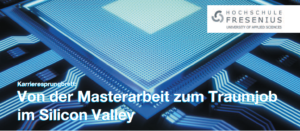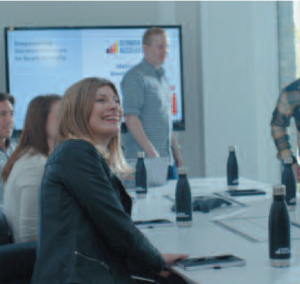A career springboard: From master’s thesis to dream job in Silicon Valley
A garage, a few dedicated young people with a passion for technology and computers: with very little money, global corporations such as Apple, Google and Hewlett Packard were founded in Silicon Valley. Today, the area in California is still one of the most important locations for the IT and high-tech industry. For many job starters and start-ups it is a dream to work and live there. For Kathrin Wiesner, who studied Digital Management (M.A.) at the Hochschule Fresenius in Cologne, this dream came true.
 As part of her Master’s degree in Digital Management (M.A.) at the Hochschule Fresenius in Cologne, Kathrin Wiesner took part in a research excursion with the Dean of Studies, Prof. Richard Geibel, and was immediately impressed by this start-up ecosystem in the USA.
As part of her Master’s degree in Digital Management (M.A.) at the Hochschule Fresenius in Cologne, Kathrin Wiesner took part in a research excursion with the Dean of Studies, Prof. Richard Geibel, and was immediately impressed by this start-up ecosystem in the USA.
For her master’s thesis she then logically examined the success factors of the Silicon Valley and their significance for German start-ups. To this end, she conducted expert interviews in cooperation with the “German Accelerator Silicon Valley”, which is sponsored by the Federal Ministry of Economics and Energy.
What makes Silicon Valley so extraordinary and successful? Is its image really right? Is it absolutely necessary for a German start-up to expand into Silicon Valley to become a global player? What factors should German entrepreneurs consider in their internationalization strategies?
Silicon Valley – an El Dorado for founders
Kathrin Wiesner pursued these questions in her final thesis. She analyzed the ecosystem of the Silicon Valley and interviewed twelve German founders who live and work there. In summary, the results show that Silicon Valley still benefits from the large amount of capital, the know-how, the experience of the many talents, and the success stories of the past. However, negative aspects such as social and economic challenges are often not noticed in Germany, the graduate explains. For example, the highly qualified personnel demand much higher salaries than is the case in Germany. The consequence: the cost of living is rising and the gap between rich and poor is widening. Many new, smaller start-ups cannot keep up with the big companies and cannot afford to pay expensive staff.
Even though there are numerous investors in the economic center who are willing to take risks, the seemingly unlimited financial resources are not available to everyone, Wiesner points out. It is much more difficult for foreign companies to find investors than for US companies. Nevertheless, Silicon Valley offers many advantages, such as a large network, a pool of highly qualified talent, few bureaucratic hurdles and a risk-averse start-up mentality.
Wiesner recommends:
“A stay in Silicon Valley is particularly worthwhile for German start-ups with a technical focus. They should look for a strategic partner, build up a network step by step, and carefully analyze whether they should expand there.
 Kathrin Wiesner was so enthusiastic about the opportunities offered by the Silicon Valley ecosystem that she applied for the position of Marketing Manager at the German Accelerator at the end of her Master’s program. Just in time for the successful completion of her studies, she received the desired acceptance and has been working full-time in California since March 2019.
Kathrin Wiesner was so enthusiastic about the opportunities offered by the Silicon Valley ecosystem that she applied for the position of Marketing Manager at the German Accelerator at the end of her Master’s program. Just in time for the successful completion of her studies, she received the desired acceptance and has been working full-time in California since March 2019.
Article published in: COMPACT Winter term 19/20 p. 109